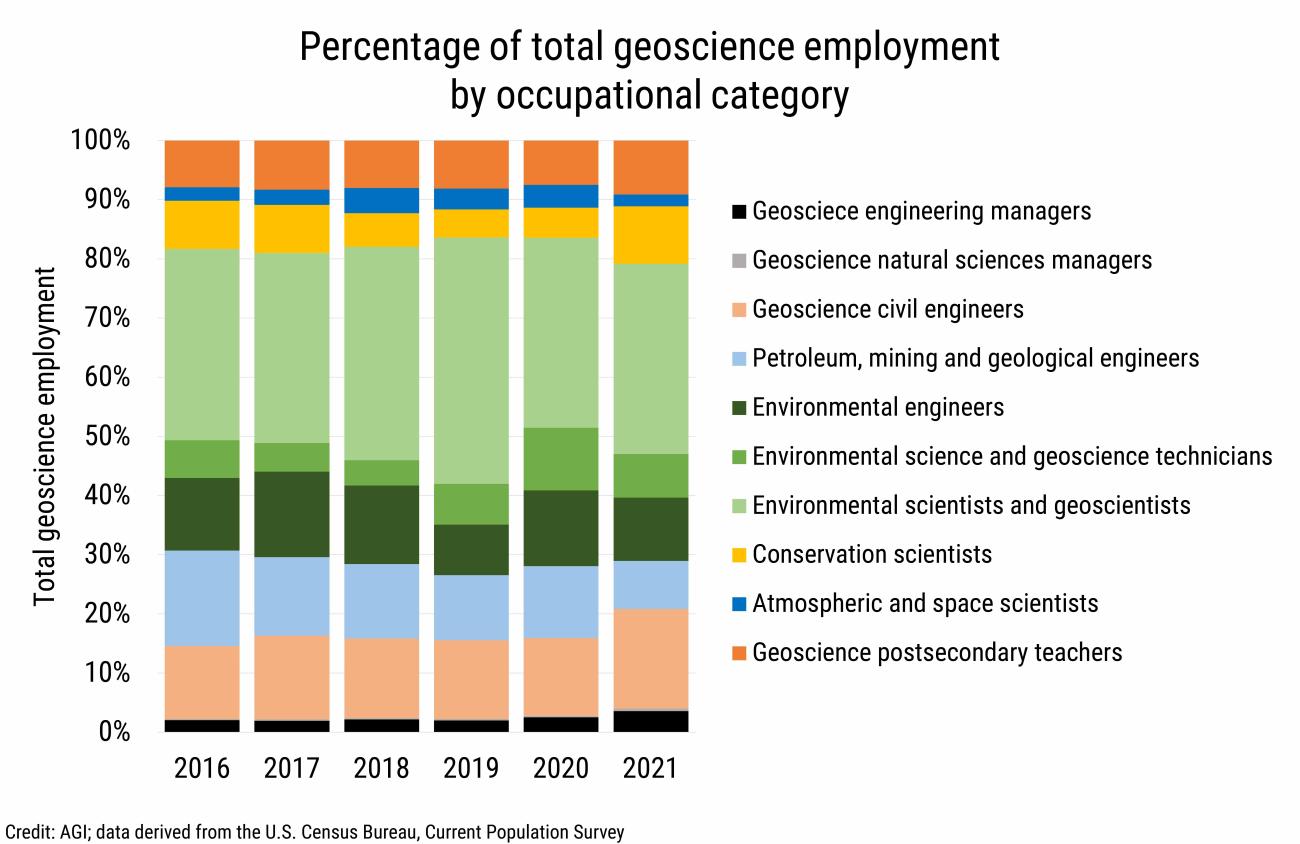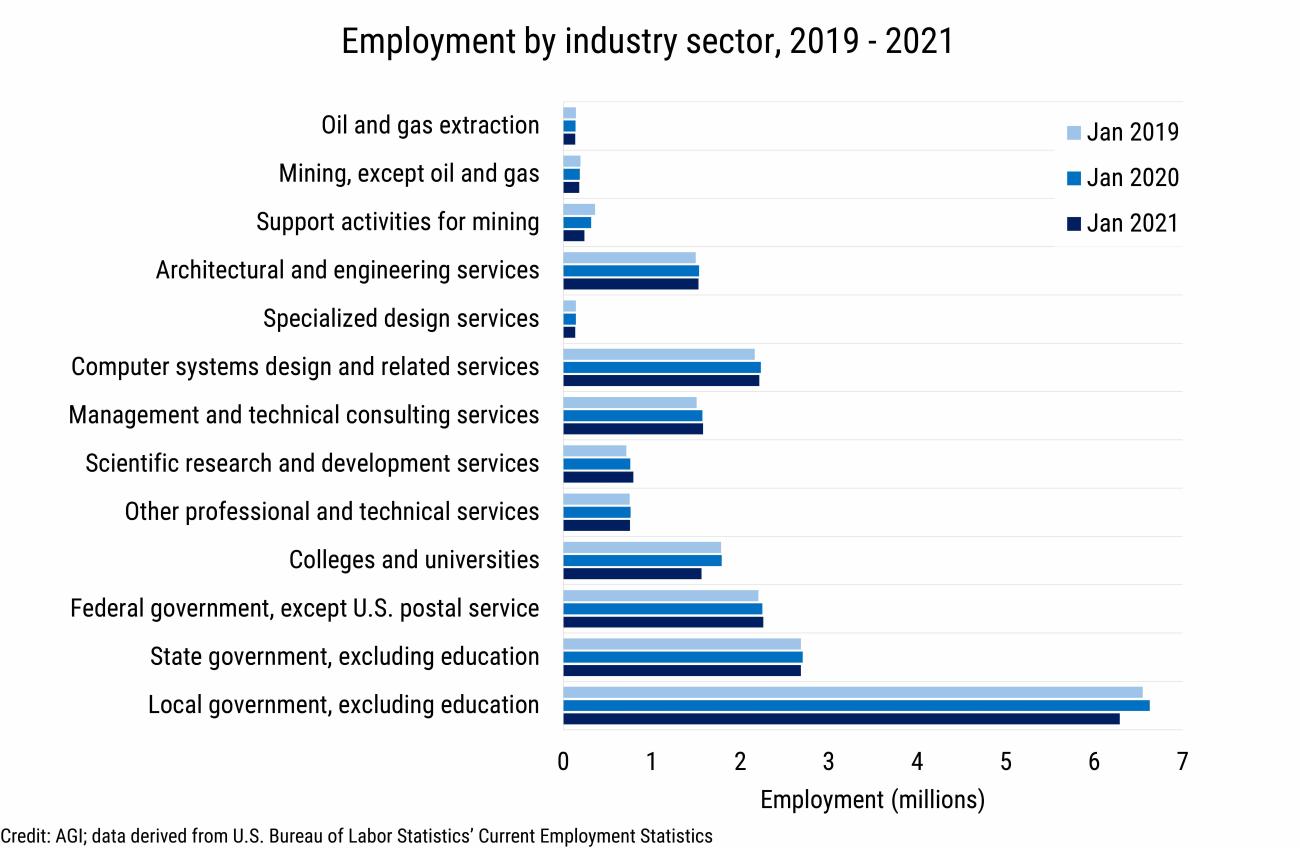Geology Careers
Overview
Geology is a multidisciplinary field that includes applications of math, physics, chemistry, and computational skills to gain a better understanding of the Earth and its environment, so it is a great program that prepares students for a wide range of careers in industry, non-profit organizations, academia, education, policy, and government. Most geoscience employers value a mix of skills including computational/GIS experience, laboratory and analytical experience, and field experience.
What you do in a geoscience job will vary based on the position and job sector. For example, geoscience jobs in the geotechnical and environmental fields can include gathering and portraying spatial information for a site in GIS, working with biologists to characterize wetland areas, collecting samples from soil and groundwater, ensuring compliance with environmental regulations, communicating scientific information to stakeholders, operating field equipment, and creating work plans related to health, safety and field work. Other geoscience jobs can be more focused on collecting data in the field using either geological or geophysical methods, interpreting remote sensing data, and interpreting data to produce geological reports and maps.
The balance of field and office work required for a geoscience job will also depend on the position. Some jobs may involve a significant amount of field work and travel, which may require the applicant to have a driver's license (and a fair driving record), the ability to lift heavy items, the ability to walk across rough terrain in all weather conditions, and the ability to work independently in remote locations. Other geoscience jobs may consist entirely of lab and office work with an option to telework. Students are encouraged to research geoscience jobs and read different job descriptions to get a sense of what they would do on a daily basis and what other qualifications they may need.
Geoscience students can further their education and expertise by completing a Masters or PhD in Geology, or they can seek entry level positions upon graduating with their undergraduate degree. Obtaining a professional geological license through the state (where applicable) is another option to further advance your geoscience career. Continue reading for information about geological licensing in Washington State!
Visit the links below to learn more about the different career opportunities in the geosciences!


Outlook & Pay
According to the U.S. Bureau of Labor Statistics, employment of Geoscientists is projected to grow at the rate of 5% from 2022-2032 (faster than the average rate for all occupations).
The need for geologists is evident by their presence in every sector, including government agencies, non-profit, private industry, environmental conservation, policy, and academia/education. Geologists will continue to be in demand as the need for energy, environmental protection, and responsible land and resource management continues.
The median pay for geoscientists as of May 2022 was $87,480. The top five highest paying industries are:
- Federal government
- Mining, quarrying, and oil and gas extraction
- Architectural, engineering, and related services
- State government (excluding education and hospitals)
- Management, scientific, and technical consulting services
For more information about the Geoscientist career outlook, please visit the Bureau of Labor Statistics website.
Getting Professionally Licensed
Geologist License Education Requirements
A professional license is required by law to practice geology in Washington State. The first step toward licensure is passing the National Association of State Boards of Geology (ASBOG) Fundamentals of Geology exam. To qualify to take ASBOG’s Fundamentals of Geology exam you must satisfy certain educational requirements. These requirements are a degree in the Geosciences (Geology BA, BS, or Geophysics BS), which must include at least 36 credits of upper-division geology courses, with at least 21 of those credits including courses in Mineralogy, Petrology, Earth Materials, Economic Geology, Engineering Geology, Field Camp (field mapping), Geomorphology, Geophysics, Geochemistry, Hydrogeology, Sedimentology, Stratigraphy, Structural Geology. Please consult your departmental advisor to ensure your plan of study will meet these requirements.
Some licensed geologists also work in the areas of hydrogeology and engineering geology. To best prepare for these professions choose your geology electives from the following GEOL courses: 314, 412, 413, 430, 440, 452, 470, 472, 473, or 474.
Career Resources
Job Boards
Faculty Advisors
Every student's career goals and interests are unique; current students are highly encouraged to meet with their faculty advisor to discuss their individual career paths.
Not sure who your faculty advisor is? Faculty advisors are listed on top of students' Degree Works page. You can also contact the Geology Undergraduate Program Coordinator at parkh23@wwu.edu.
Geology Department Listservs
The Geology Department forwards job openings to the internal department listservs. Please contact the Geology Office at geology@wwu.edu if:
-You are a current geology student who has not been receiving departmental emails (please check your spam mail first!)
-You are a geology alumni who would like to subscribe to the Geology alumni listserv
If you are an employer who would like to advertise a job opening to WWU Geology students and alumni, please email geology@wwu.edu a description of the position and contact information for questions.
Other Resources
Handshake

Handshake is Western's official recruiting and career fair platform that connects Western students and alumni with employers.
Set up a free account today!
WWU Career Services Center
Need help finding an internship or applying for jobs? Visit the WWU Career Services Center in Old Main 280 to meet with a career counselor, receive grad school advising, get help with resumes and cover letters, and more!
Additional Information
Examples of Geoscience Job Titles
Ore Control Geologist
Environmental Associate
Mine Geologist
Site Manager
Natural Resource Scientist
Geospatial Data Research Scientist
Landslide Geoscientist
Geology Assistant
Hydrogeologist
Geologic Mapper
Forest and Fish Hydrogeologist
Park Ranger
Office Manager and Associate Geologist
Scientific Instructional Technician
Hydrologic Technician
Water Quality Data Coordinator
Seismic Data Technician
Field Engineer
WWU Geology alumni have been hired by...
AESI
Associated Earth Sciences
ATC Group Services
BGC Engineering
Bureau of Land Management
Cascade Volcano Observatory
Coastal Geologic Services
Department of Health
Department of Oregon Geology and Mineral Industries
Earth Solutions NW
GeoResources
Geosyntec Consultants
Geotest Services
Golder-WSP
Great Basin Institute
HWA Geosciences
i-80 Gold Corp
Johns Hopkins Applies Physics Laboratory
Kinross Fort Knox
Materials Testing & Consulting
Midway Sewer District
Minnesota Geological Survey
NAEVA Geophysics
NASA
Nelson Geotechnical Associates
Northwest Hydraulic Consultants
Quality Geo NW
SLR International Corporation
Teck
United States Forest Service
USGS
Washington Asbestos Testing
Whatcom Community College
Local Geoscience Organizations
Associated Earth Sciences (Kirkland, Mt Vernon, Tacoma)
ATC Group Services (Seattle)
Coastal Geologic Services (Bellingham)
Earth Solutions NW (Redmond)
GeoResources (Fife)
Geosyntec Consultants (Seattle)
Geotechnical Associates (Woodinville, Wenatchee)
Geotest Services (Bellingham, Arlington, Oak Harbor)
Golder-WSP (Redmond)
HWA Geosciences (Bothell)
Materials Testing & Consulting (Bellingham, Tukwila, Burlington, Olympia, Silverdale)
Nelson Geotechnical Associates (Woodinville, Wenatchee)
Northwest Hydraulic Consultants (Bellingham, Seattle, Olympia)
Quality Geo NW (Lacey, Nelson)
Sound Geology (Bellingham)
Stratum Group (Bellingham)
Terraphase (Tacoma, Woodinville)
Washington Asbestos Testing (Kirkland)
(WWU Geology is not affiliated with or endorsed by the organizations above. This list is a resource for prospective or current students seeking information about possible career paths in geoscience and is a small snapshot of geoscience-related organizations in Washington State.)